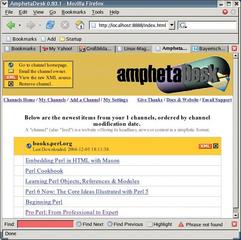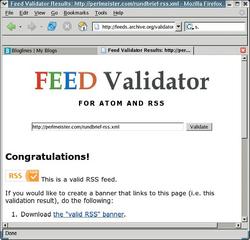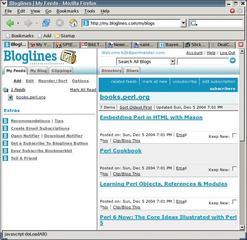A Perl script for Automatically Collecting News Headlines
Spot Reporter
Michael Schilli
A Perl script for Automatically Collecting News HeadlinesSpot ReporterMichael Schilli |

|
The sheer bulk of information on the Internet means that nobody can read it all. Visiting a couple of dozen websites a day to pick up the latest news is so time consuming that you would need to quit your job to get finished.
This prompted many news sites to introduce RSS feeds with headlines and links to articles in machine-readable format. RSS is short for RDF Site Summary, where RDF means Resource Description Framework. RSS files use XML - a format that so-called news aggregators can easily parse. Articles that users have not yet read are served up as clickable headlines.
| The Author |
|

Michael Schilli works as a Software Developer at Yahoo!, Sunnyvale, California. He wrote "Perl Power" for Addison-Wesley and can be contacted at mschilli@perlmeister.com. His homepage is at http://perlmeister.com. |
This process of Syndication, that is, compiling and serving up messages that are available from another location, helps to manage the flood of information and saves a lot of time.
Well-known sites such as Slashdot now offer RSS feeds, which aggregators such as Amphetadesk ([2] and Figure 1) fetch at regular intervals if a user has subscribed to the service, that is, clicked the Subscribe button.
Unfortunately, not all news pages have RSS feeds. Do they really think that users will stop by every day to rummage through the information they provide? The RssMaker module that we will be looking at in this article gives you a function that can help you generate an RSS file from a title page with headlines and URLs with about 10 lines of Perl code. If you then set up a cronjob to generate the RSS file once a day, you can hand the file to your news aggregator, which will give you the kind of extensive news coverage we have come to expect in the 21st century.
All it takes is a call to the make function inside the RssMaker Perl module, shown in Listing 1, RssMaker.pm. It expects a URL that points to the news site. It picks up the site off the Web, parses its HTML, and then extracts embedded links and their display text. For every instance it finds, it calls a user-definable filter function, passes it the link and its textual description, and lets it decide. If the filter function returns a true value, the link is a headline and gets added to the RSS overview.
Finally, make() sends the XML output to a file specified by the output parameter.
To convert the HTTP time stamp in the Web document into the ISO-8601 format that RSS needs, the str2time function of the HTTP::Date module first scans the date string (for example, "Tue, 26 Oct 2004 05:10:08 GMT") and returns the Unix time in seconds. The from_epoch() function of the DateTime module grabs the value and generates a new DateTime object, which gets converted to ISO-8601 format inside double quotes ("2004-10-26T05:10:08").


XML expects UTF-8 encoded text. UTF-8 is compatible with regular ASCII, as long as you avoid characters from the upper half of the 256 character table. This means that special characters used in some European languages can be a problem. Think German umlauts or French accented characters.
If you use any characters of the upper half with ISO-8859-1, they won't be UTF-8 compatible.
RssMaker avoids this problem by allowing developers to specify the encoding in the resulting RSS document. If the website in question has HTML encoding such as ü for "ü", the HTML::TreeBuilder will convert the extracted link texts to ISO-8859-1. The ASCII code of this character is 252.
However, if the RSS file had specified
<?xml version="1.0" encoding="utf-8"?>
and the "ü"s were ASCII 252 encoded, this would cause a problem. Developers can specify encoding => "iso-8859-1" for the make function to write the following to the XML document:
<?xml version="1.0" encoding="iso-8859-1"?>
and 252 encoded "ü"s are correctly interpreted by the news aggregator.
Let's put RssMaker to the test and create an RSS feed of books.perl.org's great web page. The site features reviews and ratings of books on Perl, and it's interesting to see when new books get added. Since this happens quite infrequently, having an alert system would be great.
bpo2rss shows how to quickly accomplish this task. The make function of the RssMaker module does the heavy-lifting. The url parameter specifies the URL for books.perl.org's web page, containing links to recently discussed books. output specifies the name of the resulting RSS file. title is the title of the feed shown later in the news aggregator.
RssMaker calls the anonymous filter subroutine once per link. Each time it does so, RssMaker passes two parameters: the URL for the link and the matching text. The subroutine uses this information to check if the link is a headline that it should add to the feed. If the filter returns a 1, the link is added to the feed; if the filter returns a 0, the link is not added. In the case of books.perl.org's site, bpo2rss simply checks if the URL matches the pattern /books/n where n is a numeric value. That seems to be the books.perl.org's convention on linking to book reviews. That's all it takes to complete the RSS feed.
It's even possible to modify the extracted link or its textual description before it is added to the RSS feed file, by using a simple trick: If you pass a parameter to a subroutine in Perl, this gives you both read and write access. Setting $_[0] in the function to a different value will modify the parameter passed in by the main program. When make calls filter($url, $text) and filter modifies $_[0] or $_[1], then $url or $text will have changed in the bpo2rss, resulting in modified entries in the outgoing RSS feed file.
Services such as Blogline (www.blogline.com) run Web applications that allow registered users to subscribe to feeds and actively monitor these feeds for updates. My tip for a local tool is Amphetadesk ([2]), a Perl script that runs as an HTTP server on the local machine and displays an overview of headlines in your browser (Figure 1).
If you want to check if the RSS file fulfills the strict rules of the standard, you can validate the file online:
http://feeds.archive.org/U validator/
has a free realtime service and gives you a really neat looking seal of approval if your feed checks out okay (Figure 2).
RssMaker.pm uses Log4perl in easy mode for debugging, LWP::UserAgent to fetch the URLs and XML:RSS to create the RSS file. decode_entities from HTML::Entities decodes HTML escape sequences such as ü. The exlinks function in RssMaker.pm provides link extraction using HTML::TreeBuilder. as_trimmed_text() digs the text out of HTML's <A> link tags.
| Listing 1: RssMaker.pm |
|
001 #############################
002 # RssMaker -- Generate a RSS
003 # feed of a web page
004 # Mike Schilli, 2004
005 # (m@perlmeister.com)
006 #############################
007 package RssMaker;
008
009 use warnings;
010 use strict;
011
012 use LWP::UserAgent;
013 use HTTP::Request::Common;
014 use XML::RSS;
015 use HTML::Entities
016 qw(decode_entities);
017 use URI::URL;
018 use HTTP::Date;
019 use DateTime;
020 use HTML::TreeBuilder;
021 use Log::Log4perl qw(:easy);
022
023 #############################
024 sub make {
025 #############################
026 my (%o) = @_;
027
028 $o{url}
029 || LOGDIE "url missing";
030 $o{title}
031 || LOGDIE
032 "title missing";
033 $o{output} ||= "out.rdf";
034 $o{filter} ||= sub { 1 };
035 $o{encoding} ||= 'utf-8';
036
037 my $ua =
038 LWP::UserAgent->new();
039
040 INFO "Fetching $o{url}";
041 my $resp =
042 $ua->request(
043 GET $o{url} );
044
045 LOGDIE "Error fetching ",
046 "$o{url}"
047 if $resp->is_error();
048
049 my $http_time =
050 $resp->header(
051 'last-modified');
052
053 $http_time ||=
054 time2str( time() );
055
056 INFO "Last modified: ",
057 $http_time;
058
059 my $mtime =
060 str2time($http_time);
061
062 my $isotime =
063 DateTime->from_epoch(
064 epoch => $mtime);
065
066 DEBUG "Last modified:",
067 $isotime;
068
069 my $rss =
070 XML::RSS->new(
071 encoding =>
072 $o{encoding} );
073
074 $rss->channel(
075 title => $o{title},
076 link => $o{url},
077 dc => {
078 date => $isotime . "Z"
079 },
080 );
081
082 foreach(exlinks(
083 $resp->content(),
084 $o{url})) {
085
086 my ($lurl, $text) = @$_;
087
088 $text =
089 decode_entities($text);
090
091 if ($o{filter}->(
092 $lurl, $text)) {
093
094 INFO "Adding rss ",
095 "entry: $text $lurl";
096
097 $rss->add_item(
098 title => $text,
099 link => $lurl);
100 }
101 }
102
103 INFO "Saving output in ",
104 "$o{output}";
105 $rss->save( $o{output} )
106 or LOGDIE "Cannot write",
107 " to", " $o{output}";
108 }
109
110 #############################
111 sub exlinks {
112 #############################
113 my ($html, $base_url) = @_;
114
115 my @links = ();
116
117 my $tree =
118 HTML::TreeBuilder->new();
119
120 $tree->parse($html)
121 or return ();
122
123 for(@{$tree->extract_links(
124 'a')}) {
125 my ($link, $element,
126 $attr, $tag) = @$_;
127
128 next
129 unless $attr eq "href";
130
131 my $uri =
132 URI->new_abs( $link,
133 $base_url );
134
135 next
136 unless length $element
137 ->as_trimmed_text();
138
139 push @links,
140 [
141 URI->new_abs(
142 $link, $base_url
143 ),
144 $element
145 ->as_trimmed_text()
146 ];
147 }
148
149 return @links;
150 }
151
152 1;
|
The RSS standard looks set to be replaced by a new standard called Atom sometime in the near future. The usual committees are already working on this problem. If the Atom clients listed at [6] reach a critical mass, CPAN will probably have an AtomMaker module with similar functionality to RssMaker to match. It will then use the XML::Atom module, which today is already available on CPAN. At present, many popular clients do not support the Atom format, and some of the listed clients are extremely buggy. [3] gives you an introduction to Atom, and there is a simple tutorial at [4].

All of the modules required by RssMaker.pm are available from CPAN. You should set up any scraper scripts such as bpo2rss to run on your sysem as cronjobs, typically once a day. The resulting RSS files should only be published on the local Intranet, since publishing RSS files on the Internet could be interpreted as deep linking and might lead to legal problems.
During the debugging phase, it makes sense to set the Log4perl setting for the script to $DEBUG. The benefit of setting Log4perl to $DEBUG is that the $DEBUG value will allow you to monitor activities such as fetching, link extraction, and RSS feed generating on screen. In a production environment, you can use the $ERROR setting instead to remove any unwanted output and stop the cronjob from bombarding you with email messages.
| Info |
|
[1] Listings for this article: http://www.linux-magazine.com/Magazine/Downloads/51/Perl [2] Amphetadesk, "Syndicated Aggregator" http://www.disobey.com/amphetadesk [3] Michael Fitzgerald, "XML Hacks", O'Reilly [4] Reuven Lerner, "Aggregating with Atom", Linux-Journal 11/2004, p. 18ff. [5] Ben Hammersley, "Content Syndication with RSS", O'Reilly 2003 [6] List of applications that support Atom: http://atomenabled.org |